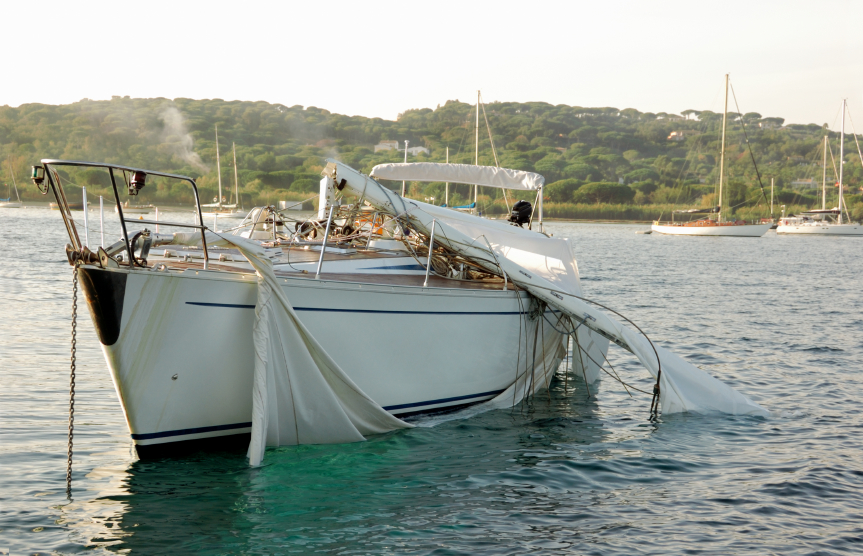Understanding California Boating Laws

Given that California is home to stunning Pacific Coast beaches, gorgeous bays, tranquil lakes, and roaring rivers, there are numerous opportunities to get out on the water. Boating is a wonderful way to explore the coast and relax during the summer, but many boat operators get too loose with the rules. Whether it is due to inexperience, reckless boating maneuvers, or ignoring safety procedures, negligent boating operators cause serious, and often fatal, boating accidents across California.
Most Common Boating Accidents
4,168 boating accidents occurred across the United States in a single year, and 1,013 accidents occurred over a five-year period in just California alone, according to the United States Coast Guard (USCG). In addition, 218 people died in boating accidents during that same five-year period. According to the California Division of Boating and Waterways (DWB), these tragic events are largely caused by some form of operator negligence, such as being distracted, intoxicated, or reckless.
In researching, the USCG identified the top five boating accidents, which include:
- Collisions between boats
- Collisions with fixed objects
- Grounding, or running a boat ashore
- Boats flooding
- Passengers falling overboard
These accidents can be caused by a variety of factors, but the majority are related to some form of negligence. In fact, the USCG has also noted the top 10 primary contributing factors in boating accidents, which include:
- Operator inattention or distraction
- Improper lookout
- Operator inexperience
- Speeding
- Alcohol use and intoxication
- Mechanical failures
- Poor navigation
- Weather
- Hazardous waters
- Force of wave/wake
Even in cases of weather or hazardous waters, boat operators should always try to operate their vessels as safely as possible. They may need to cancel trips out on the water due to poor weather conditions, but so long as they and their passengers are safe, that’s all that matters. Operators should always put safety first and abide by all of California’s boating laws.
What Rules Should Boaters Follow in California?
All boat operators in California must register their vessels with the Department of Motor Vehicles and must complete a boat-safety education course to operator a vessel with a valid license. Despite these training courses, many boaters still neglect basic safety standards and cause serious boating accidents throughout the state.
Operator Regulations
In addition to being certified and licensed, boat operators should always keep their minds focused on safely operating the vessel. This means avoiding all alcohol use, which can result in a Boating Under the Influence (BUI) charge if the operator has a blood alcohol content level (BAC) between 0.05% and 0.08%. In addition, only individuals over the age of 15 may operate a motorboat that uses more than 15 horsepower, and then only if they have completed a safety course. Adult operators should only allow certified individuals to use their vessels. Allowing an inexperienced person to operate a boat in California can be considered an act of negligence in a boating accident claim.
Carbon Monoxide Risks
One of the looming dangers on boats is carbon monoxide (CO). According to the Centers for Disease Control and Prevention (CDC), this toxic gas can build up underneath a boat and cause nearby swimmers to pass out, leading to fatal drownings. Boat operators should turn off the motor or generator while a passenger is on a swim platform, swim deck, swim step, or swim ladder. In addition, if a boat is traveling at low speeds or at a high bow angle, CO can build up in the cabin, cockpit, bridge, and aft deck. Operators should install and maintain their engines according to all safety standards and inform passengers of the symptoms of CO poisoning in order to prevent fatal injuries.
Safety Equipment
There must be at least one life jacket on board a boat for every passenger, including the boat’s owner and operators. They must be easy to access and should properly fit each person in the event of an accident. In addition, any child under the age of 13 should wear a Coast Guard-approved life jacket. In addition, if a boat is being towed, everyone aboard must wear a life jacket.
Beyond life jackets, operators should also have the following safety devices aboard to help prevent further injuries in an accident:
- Navigation lights
- Sound signaling devices
- Visual distress signals
- Fire extinguishers
What Should I Do If I Have Been in a Boating Accident?
If you have been involved in a boating accident in California, you should contact local authorities for immediate aid. If you or someone you love was injured or killed in an accident, understand that you may have the right to file a personal injury claim if a boat operator was negligent. These claims can be complex, with a lot of conflicting statements, which is why you should contact an attorney to work through the details. The Law Firm of Joseph H. Low IV is well-versed in a variety of personal injury claims and can represent you in a settlement negotiation or jury trial to receive compensation for your injuries. To discuss your case in a free consultation, call our office at (562) 901-0840 or toll-free (888) 454-5569.